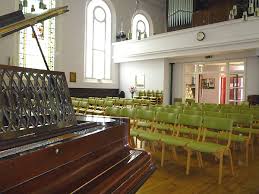Unitarian Church Brighton, Sunday 6 July 2014
Four concerts on Sunday afternoons with works by Mozart in each one, and more recent compositions by local composers, sounds like a good plan for the summer to bridge the days between the end of last season and the start of the new in October.
On this first occasion the string quartet brought together violinists Daniel Bhattacharya and Roland Roberts, viola Bruce White and cellist Peter Adams. They opened with a delightful reading of Mozart’s Divertimento in D major. The acoustic in the church is very close and at first the impact seemed almost too loud – like being in the front room of a hi-fi enthusiast who likes the volume too high – but this soon settled and clarity of texture returned. They found a lightness in the opening Allegro, particularly in the quieter passages, and a fine cantabile in the Andante which danced with subtle joy. The short, bright Presto brought the work to a warm climax and it was obvious the players were thoroughly enjoying themselves.
The afternoon ended with the arrangement of Mozart’s Piano Concerto No12 in A for piano and string quartet, ideal for the small venue. The Bluthner piano has a wonderfully warm tone and was perfectly balanced with the quartet, Jeremy Young being the sensitive pianist. If anything it was difficult to image so intimate a work played by larger forces, so successful is this arrangement. The playful final Allegretto brought the afternoon to a warmly received climax.
Between these two works we were to have heard two works by Ian Morgan–Williams. In the event Several Endings was not ready for performance so we heard only Five or Six Corridors. The work is scored for piano trio. Despite the introduction by the composer it was very difficult to follow the narrative of the thirteen brief pieces and one quickly became lost among the corridors themselves. Towards the middle of the set there is a slow, lyrical section led by the solo cello which builds to heavy, chunky chords on the piano, only to die away as quickly as it arrived. Near the end another lyrical outpouring for the cello – almost a folk melody – is equally impressive. Unfortunately much of the rest of the set seemed discordant and unfocussed, the intense intimacy of the writing being momentarily arresting but not adding to our overall understanding of the piece.
The next concert on 20 July brings works by Mozart, Schubert and Tchaikovsky, plus Peter Copley’s 2nd string quartet. Details on www.brightonphil.org.uk

